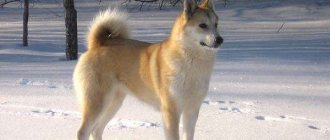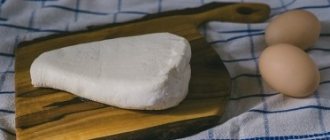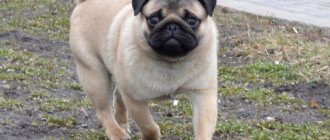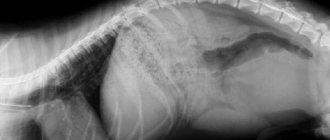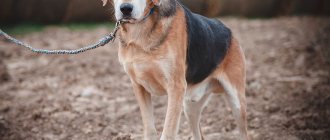The Pomeranian Spitz is a miniature dog, strong, compact, with lush hair and a good-natured disposition.
The average height of a Spitz at the withers is 28 cm, weight is 3-4 kg.
The head of such a dog is wedge-shaped, the skull is rounded, slightly flattened, the body is covered with fluffy hair with a thick undercoat.
The most common colors are red, white, black, blue, cream and brown.
How many years have they lived at home?
| Pomeranian Spitz variety | Minimum life expectancy (in years) | Maximum life expectancy (years) | Average life expectancy (in years) |
| Super mini or toy (height at withers less than 18 cm) | 5 | 7 | 6 |
| Mini (height at withers -20-25 cm) | 8 | 10 | 9 |
| Fox type (height at withers -26-28 cm) | 12 | 15 | 13 |
| Bear type (height at withers -26-28 cm) | 12 | 15 | 13 |
Expert opinion
Kozhevin Semyon Kirillovich
Expert dog handler.
“If we talk about the average life expectancy of a Spitz, then a lot depends on the owner. This breed is quite strong and healthy, so care and maintenance play a key role here. On average, the Pomeranian Spitz lives 14-15 years, but under good conditions, some individuals live up to 20.”
Why do dwarfs live so short
Dogs in the super-mini category are in demand today. They appeared recently and immediately fell in love. They have no dog smell at all, and their tiny size allows you to take your pet with you . At the same time, the life of such a dog will not be long.
Breed standards, according to which a dog's height is at least 20 cm, were not adopted by chance. They keep animals in good health and ensure a long life. Dwarf-sized dogs have extremely brittle bones and a particularly sensitive pancreas.
Even under ideal conditions, a mini Spitz will rarely live more than 8–10 years—a record for such a pet.
Age compared to human years
| Pomeranian Spitz age (year) | Human age (year) |
| 1 | 14 |
| 2 | 24 |
| 3 | 30 |
| 4 | 36 |
| 5 | 40 |
| 6 | 42 |
| 7 | 49 |
| 8 | 56 |
| 9 | 63 |
| 10 | 65 |
| 11 | 71 |
| 12 | 75 |
| 13 | 80 |
| 14 | 84 |
| 15 | 87 |
| 16 | 89 |
| 17 | 91 |
| 18 | 93 |
How to determine age?
The age of a dog, including a Spitz, is determined by several criteria: the condition of its teeth, fur and eyes.
If we are talking about a puppy , then you need to pay attention to the number of teeth :
- A newborn puppy has no teeth.
- At 3 weeks of age, the pet's fangs begin to erupt.
- Front teeth appear in a month
- At 2 months, the entire deciduous dentition is already present.
- At the age of 2-4 months, the puppy’s teeth begin to change to permanent ones.
- A 6-month-old pet's primary fangs fall out and permanent ones appear.
- By 8 months, the change of teeth is completely completed.
Determining the age of an adult dog by its teeth:
- The one-year-old dog has a full row of white and strong permanent teeth.
- At 2 years old, the tubercles on the lower toes begin to wear out.
- At 4 years old, the tubercles on the upper toes are already erased.
- At the age of 5, the tubercles on all incisors wear off, and the teeth begin to acquire a yellowish tint.
- At 6 years of age, the incisors become concave and the canines become blunt.
- At 8-9 years of age, pronounced abrasion of all teeth is observed.
- At the age of 10 and sasha, the dog’s teeth begin to loosen and fall out.
A pet's coat can also tell a lot about its age . Young dogs have a silky, shiny, glossy coat. In an elderly dog, it is dull, unevenly colored, and has bald spots in places.
Age can also be judged by the eyes.
NOTE!
A young healthy dog has clean, clear eyes full of life and excitement.
An older dog often has a dull look, and his eyes are often cloudy and deep-set.
Main causes of premature death
The most common causes of premature death in Pomeranians:
- Poor care and unsuitable living conditions. If the pet is not seen by a veterinarian, is not treated for parasites and worms, and does not receive the necessary disease prevention.
- Overeating and excess weight. Like most small breeds, the Spitz is prone to obesity, especially in old age. And this, in turn, has a detrimental effect on the condition of the dog’s liver, heart, blood vessels and joints. Overweight pets live 4-5 years less.
- Foreign body in the intestine. It happens that a dog picks up discarded food or scraps on the street, as a result of which a foreign object can enter the gastrointestinal tract, which causes intestinal blockage and often ends in death.
- Poisoning by poisons. One of the most common causes is rat poison poisoning.
- Poisoning from stale food often causes diarrhea, and in advanced cases can be fatal.
- Peptic ulcer of the gastrointestinal tract. With a peptic ulcer, ulcers and holes appear in the Spitz's stomach and intestines, which often leads to internal bleeding and death.
- Infectious diseases, such as adenovirus, canine distemper, infectious hepatitis.
Training
Since Spitz dogs are characterized by disobedience and capriciousness, they need to be trained from a very early age. During training, you should not shout at the dog, much less hit it. With a little patience, in a few months you will have a well-mannered dog who can perform simple tricks.
How many years Spitz dogs live (Pomeranian, small, medium or large) directly depends on whether they know basic commands. Unquestioning obedience to the owner can protect the baby from the numerous dangers that await him on the city streets. It is also important to teach your pet to walk on a leash and not pick up anything from the ground.
How to extend the life of a pet?
In order for your pet to live as long as possible, it requires proper care and appropriate living conditions.
What do we have to do:
- Give your pet maximum attention and try to protect him from stress.
- Daily walks, active games, communication with people and other pets are the key to health and long life.
- The Spitz's diet must be balanced and include all the necessary substances (vitamins, micro- and macroelements). In addition, nutrition should be adjusted according to age.
- Be sure to take your pet for a routine preventive examination to the veterinarian twice a year.
- All harmful foods should be excluded from the dog’s diet: flour products, smoked meats, sausages, sweets, etc.
- Under no circumstances should a Spitz live in a draft, cold or damp place. You should also avoid overheating in the sun.
- Hygiene procedures (trimming nails, combing, bathing, teeth cleaning, etc.) should be performed regularly and correctly. This will help prevent many health problems.
- The pet must receive a standard preventative vaccine annually.
- Your dog should be treated regularly for fleas and ticks.
- Every 3 months the pet is given antihelminthic medications.
Tendency to diseases
Representatives of this breed are distinguished by fairly good health. Their average age is about 12-16 years. But in reality, this figure depends on several different factors, among which the size of the animal plays an important role. Those who are interested in how many years Mini Pomeranians live should remember that these little ones are very fragile and tender. And their lifespan is slightly shorter than that of their larger counterparts.
Representatives of this breed love to eat. Therefore, they often develop obesity, leading to problems with internal organs. The special structure of the head and larynx often provokes coughing and increased tearing. Since German Spitz dogs have fairly fragile bones, they are easily injured and are prone to subluxation of the knee joint. To prevent this from happening, owners need to prevent their pets from jumping from great heights.
In addition to the above-mentioned breed ailments, Spitz dogs can suffer from parainfluenza, leptospirosis, adenovirus, rabies, parvo- and coronavirus enteritis. But these health problems are easily preventable with annual vaccinations. Before routine vaccination, it is important to treat the animal against external and internal parasites.
Proper nutrition
Proper nutrition for a Spitz can include both natural products and dog food.
If the dog is on a natural diet, then its diet should include the following products:
- Cottage cheese.
- Kefir.
- Curdled milk.
- Meat (turkey, veal, chicken).
- Offal.
- Vegetables and fruits.
- Seafood.
- Low-fat sea fish.
- Porridge (buckwheat, oatmeal, rice).
- Vitamin complexes and supplements with microelements.
If you feed your pet dry food, you should choose premium or super premium products for decorative breeds.
Considered one of the best:
- Pro Plan dry food, which has many varieties: for puppies, for adult dogs, for aging pets, for dogs with sensitive skin, etc.
- Royal Canin dry food is designed specifically for Pomeranians and also has many varieties: for puppies, for pregnant and lactating bitches, for aging dogs, for pets prone to allergies, etc.
If a dog is on a mixed diet, then 2/3 of its diet should consist of proteins . The rest of the menu consists of cereals, vegetables, fruits, fish and dairy products.
Quality maintenance and care
Proper care of a Pomeranian includes several components.
The first thing that needs to be said is attention . Spitz are very emotional and affectionate; rudeness and indifference can cause severe stress and even illness.
The second important aspect is nutrition . The dog's diet should be balanced, and the portions should correspond to the norm. Under no circumstances should you overfeed your Spitz, or feed it from your table.
As you know, the Spitz has thick and lush hair, which requires proper care. Brush your dog at least once a week, bathe it monthly and give it a hygienic haircut.
The next aspect is hygiene . Trimming nails, brushing teeth, ears, and clearing eyes of discharge are mandatory conditions for quality care.
IMPORTANT!
The dog must also be vaccinated annually and examined by a veterinarian twice a year.
Separately, it is necessary to say about molting. During this period, the dog should be combed daily, removing the old undercoat. If this is not done, your pet's fur and skin may suffer.
Another aspect of quality care is regular flea and tick treatment for your pet. In addition, the Spitz is given antihelminthic medications once every 3 months.
Daily walks and moderate physical activity are essential for Pomeranian health..
Without them, his muscle tissue atrophies and excess weight appears. But you shouldn’t go to extremes; excessive loads lead to joint injuries and also cause stress in your pet.
Spitz life expectancy and what affects it
Depending on the size of the pet, its life can be from 6 to 20 years. Its duration is higher, the larger the Spitz. The conditions in which it is kept also affect how many years a dog will live. Animals in a metropolis always die earlier than those who spend their entire lives in rural areas. The life span of Spitz dogs is longer even if the puppies have been with their mother for a long time.
The optimal age for weaning them from the female is 3 months. If the mother stops feeding the puppies earlier, then from that moment on they can be moved to a new home. This phenomenon is usually observed when she has insufficient milk and a large litter.
Stress has a negative effect on an animal's life expectancy. Spitz are very emotional, and strong nervous experiences can cause a sharp deterioration in the dog’s health. The ideal conditions under which a pet will live as long as possible are the following: one owner throughout life, a calm environment in the house and the presence of a second dog. The latter is necessary for full communication, without which animals cannot feel comfortable. No matter how much a person loves a pet, he cannot replace a relative, and without him the Spitz will always feel bad.
Caring for an older dog
Basic rules for caring for an elderly Spitz:
- After the age of 7, it is necessary to visit the veterinarian with your dog several times a year.
- The diet must contain vitamins and nutritional supplements intended specifically for older dogs.
- If your Spitz is on a natural diet, you should reduce the amount of fat in its diet by about 1/3. Some advise partially replacing the meat portion with fish.
- Walks with an older pet should be shorter and physical activity less intense. At the same time, the dog should not be completely deprived of physical activity and outdoor games.
- Overfeeding and excess weight are very harmful for an older Spitz. If the dog has become less active, you should reduce the portions slightly.
According to veterinarians, if an older dog is lethargic and lethargic, this is not a sign of age, but a consequence of poor care.

